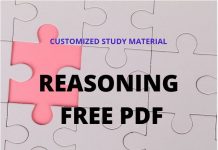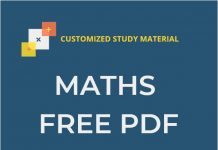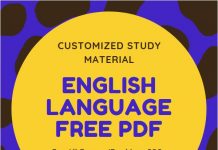Inequalities Questions for SBI PO Prelims 2017
How To Crack SBI PO 2017 >> Click Here
Reasoning Questions for SBI PO Prelims 2017
Directions (1-5): Study the following information carefully to answer these questions.
A, B, C, D, E, F and G are seven students of the Engineering college. All of them belongs to different branch of Engineering: Mechanical, Chemical, Electrical, Computer Science, IT, Textile and Electronics but not necessarily in the same order. Each one of them likes different sports Snooker, Golf, Tennis, Badminton, Cricket, Football and Volleyball not necessarily in the same order. All of them are of different height. D is taller than C and F. E is taller than G.B studies in Mechanical and likes Football. E studies in Computer Science but not likes Tennis or Cricket. The one who studies in IT likes Snooker. F likes Golf but does not studies in Chemical or Electronics. C is taller than E. B is taller than only A.A person who studies in Electrical likes Badminton. The one who studies in Electronics does not like Cricket. G studies in IT and C likes Tennis. The one who is tallest likes Badminton.
Q1.Who plays the Cricket?
(a) D
(b)A
(c)E
(d)D or E
(e) None of these
Q2.E plays which game?
(a) Badminton
(b) Golf
(c) Cricket
(d) Volleyball
(e) None of these
Q3.Which of the following combinations of branch-person-sports is definitely correct?
(a) Electrical – B –Badminton
(b) Chemical – E – Volleyball
(c) Electronics – D – Cricket
(d) Chemical – D – Cricket
(e) None of these
Q4.Who studies Textile?
(a) C
(b) D
(c) G
(d) F
(e) None of these
Q5.Who is the Golfer?
(a) C
(b) F
(c) D
(d) Cannot be determined
(e) None of these
Solutions(1-5):
D > C > E > G > B > A
From given information, we know about F that he is surely less than D and can come anywhere from D to B.
S1. Ans.(b)
Sol.
S2. Ans.(d)
Sol.
S3. Ans.(e)
Sol.
S4. Ans.(d)
Sol.
S5. Ans.(b)
Sol.
Directions (6-10): Study the following information carefully to answer these questions.
Seven family members G, H, J, K, L, M and N are going to different countries viz. UK, US, Germany, France, Italy, Russia, China not necessarily in the same order. Each one of them has a different profession from amongst CA, Admin, Accountant, HR, Manager, Engineer and Professor not necessarily in the same order.
G is the father of K’s only brother L. The one who is wife of L is anEngineer and she is going to France. The one who is brother of L is anAdmin and he does not go UK.H is the sister-in-law of K. The person who is CA goes to US. M goes to Italy. The one who is Professor goes to China. K is uncle of N.M and N are brothers. L is a Manager and he goes to Germany. G is an HR.The one who is sister of N does not go to US.J is sister of M.
Q6.Who is the Accountant?
(a) J
(b) N
(c) K
(d) M
(e) None of these
Q7.Which of the following combinations of person, profession and country is definitely correct?
(a) G – HR – Germany
(b) K – Professor – China
(c) L – Manager – US
(d) G – HR – UK
(e) None of these
Q8.Who is going to US?
(a) J
(b) K
(c) M
(d) N
(e) None of these
Q9. Granddaughter of G goes to which country?
(a) Russia
(b) China
(c) US
(d)Chandigarh
(e) None of these
Q10.Who is the Professor?
(a) N
(b) J
(c) M
(d) L
(e) None of these
Solution(6-10):
S6. Ans.(d)
Sol.
S7. Ans.(d)
Sol.
S8. Ans.(d)
Sol.
S9. Ans.(b)
Sol.
S10. Ans.(b)
Sol.
Directions (11-15): Read the following information carefully and answer the questions given below.
Eight friends P,Q,R,S,T,U, V and W are seated in a straight line at an equal distance between each other, but not necessarily in the same order. Some of them are facing north and some are facing south. T is an immediate neighbour of one who is sitting at an extreme end of the line. Only three people sit between T and V. S sits second to the right of V. S does not sit at an extreme end of the line. W sits on the immediate left of P. W is not an immediate neighbour of V. The immediate neighbour of P faces opposite directions.(i.e. If one neighbour faces north then other faces south and vice versa.) The persons sitting at the extreme ends faces opposite directions.(i.e. If one person faces north then other faces south and vice versa.)Q sits second to the left of U. U faces north. U is not an immediate neighbour of T. The immediate neighbours of U faces same directions.(i.e. If one neighbour faces north then other also faces north and if one neighbour faces south then other also faces south).Both T and Q face a direction opposite to that of S.(i.e. If S faces north then T and Q faces south and vice-versa.)
Q11. As per the following arrangements, which of the following statements is not true with respect to P . ?
(a) P faces south.
(b) P is fourth to the right of Q.
(c) P is 2nd to left of T.
(d) P is between V and W.
(e) None of these
Q12. How many person sit on the left of Q ?
(a) One
(b) Two
(c) Three
(d) Four
(e) None of these
Q13. What is the position of S with respect to P ?
(a) Immediate left
(b) Third to left
(c) Third to right
(d) Fourth to left
(e) None of these
Q14. Which of the following is immediate neighbour of Q?
(a) T,S
(b) T,U
(c) V,U
(d) R,S
(e) None of these
Q15 Four of the given five are alike in a certain way based on the given arrangement and hence form a group. Which of them does not belong to that group .?
(a) R
(b) S
(c) P
(d) U
(e) V
Solutions(11-15):
S11. Ans.(c)
Sol.
S12. Ans.(b)
Sol.
S13. Ans.(c)
Sol.
S14. Ans.(a)
Sol.
S15. Ans.(d)
Sol.
How To Crack SBI PO 2017 >> Click Here
New Pattern English Questions for SBI PO 2017
Directions (1-15): In each of the following sentences, parts of the sentence are left blank. Beneath each sentence, five different ways of completing the sentence are indicated. Choose the best alternative from among the five options.
Q1. If the more articulate members of a community formed a coherent and __________ class with a common interest, democracy would probably be __________ into the rule of that intelligent, educated __________; even as it is, the democracies of the modern world are much closer to this fate than they are to the much-canvassed __________ of mob rule.
(a) united, overthrown, minority, benefits
(b) separate, overthrown, majority, problems
(c) united, replaced, minority, dangers
(d) separate, replaced, minority, benefits
(e) united, replaced, majority, dangers
Q2. I think it is the duty of science – I do not say of every individual man of science – to study the means by which we can __________ ourselves to the new world. There are certain things that the world quite obviously needs: __________, as opposed to dogmatism in our beliefs; an expectation of co-operation, rather than __________, in social relations; a lessening of envy and collective __________. These are things which __________ could produce without much difficulty.
(a) adapt, fanaticism, competition, malice, philosophy
(b) adopt, fanaticism, affection, malice, science
(c) reorient, tentativeness, war, consciousness, science
(d) adapt, tentativeness, competition, hatred, education
(e) orient, diffidence, competition, malice, education
Q3. As man’s tool of survival, reason has two basic functions: cognition and evaluation. The process of cognition consists of discovering— A—, of identifying their nature, their —-B—–. The process of evaluation consists of man discovering the relationship of things to himself, of identifying —C– to him and —D—-, what should be sought and what should be avoided.
(a) A – what is beneficial, B – what is harmful, C – attributes and properties, D – what things are
(b) A – what things are, B – what is beneficial, C – attributes and properties, D – what is harmful
(c) A – what is beneficial, B – what things are, C – what is harmful, D – attributes and properties
(d) A – attributes and properties, B – what is beneficial, C – what things are, D – what is harmful
(e) A – what things are, B – attributes and properties, C – what is beneficial, D – what is harmful
Q4. When you first arrive in a new culture, there is a period of __________ that comes from the new situation and from a lack of information. It leaves you quite __________ and in of help in the form of information and more. The second stage begins as you start to __________ with the new culture. It is called the stage of small victories. Each new __________ with the culture is fraught with peril. It is __________ by anxiety and information collection and rehearsal. Then the event occurs and you return home either __________ or defeated.
(a) confusion, vulnerable, interact, observation, preceded, jubilant
(b) excitement, vulnerable, observe, observation, followed, victorious
(c) confusion, dependent, interact, encounter, preceded, triumphant
(d) excitement, dependent, interact, encounter, followed, victorious
(e) confusion, dependent, observe, observation, preceded, triumphant
Q5. The core of modern doctoring is diagnosis, treatment and prognosis. Western doctors have been __________ the wheezes and pains of their patients since the 17th century to identify the __________ disease of the cause of complaints. They did it well and good __________ became the hallmark of a good physician. They were less strong on treatment. But when sulphonamides were __________ in 1935 to treat certain bacterial infections, doctors found themselves with powerful new tools. The area of modern medicine was born. Today there is a __________ array of complex diagnostic tests, and of pharmaceutical and surgical methods of treatment.
(a) analyzing, deep rooted, diagnosis, conceived, burgeoning
(b) curing, deep-rooted, medicines, invented, dwindling
(c) diagnosing, widespread, prescriptions, conceived, escalating
(d) analyzing, underlying, diagnosis, discovered, burgeoning
(e) curing, widespread, prescriptions, discovered, dwindling
Q6. Today, Adam Smith is widely seen as the intellectual champion of self-interest. This is a __________. Smith saw no moral virtue in selfishness; on the contrary he saw its __________. Still less was he a __________ of capital over labour, of the rising __________ over the common folk. His __________ of self-interest and his regard for the people as a whole come through clearly in his writings.
(a) delusion, benefits, critic, middle class, mistrust
(b) misconception, dangers, defender, bourgeoisie, suspicion
(c) fallacy, risks, detractor, bourgeoisie, distrust
(d) misconception, risks, critic, bourgeoisie, mistrust
(e) delusion, benefits, defender, middle class, suspicion
Q7. A conservation problem as important as that of soil erosion is the __________ of soil fertility. Most agriculture was originally supported by the __________ fertility of the soil; and, in areas in which soils were deep and rich in minerals, __________ could be carried on for many years without the return of any __________ to the soil other than those supplied through the natural __________ of plant and animal wastes.
(a) loss, normal, cultivation, fertilizers, compost
(b) lack, usual, agriculture, nutriments, downfall
(c) loss, natural, farming, nutrient, breakdown
(d) lack, natural, farming, fertilizers, decay
(e) loss, usual, cultivation, crops, cultivation
Q8. Charles Darwin may have been __________ when he argued that competition was the major driving force of evolution. He imagined a world in which __________ battled for __________ and only the fittest __________. But new research identifies the availability of “living space,” rather than competition, as being of key __________ for evolution. Findings question the old adage of “nature red in tooth and claw”.
(a) right, animals, survival, lived, reason
(b) erroneous, organisms, survival, lived, consequence
(c) mistaken, creatures, control, survived, importance
(d) wrong, creatures, power, survived, significance
(e) wrong, organisms, supremacy, survived, importance
Q9. Approximately 17% of all global greenhouse gas emissions come from the __________ of tropical forests. So __________ and restoring these forests must form part of a __________ climate change deal; reducing __________ from the developed world is __________, but is not enough.
(a) burning, conservation, complete, forests, sine qua non
(b) elimination, preserving, broad, temperature, essential,
(c) destruction, conserving, comprehensive, emissions, essential
(d) trees, conserving, comprehensive, emissions, vital
(e) destruction, management, wide ranging, emissions, critical
Q10. A die-hard loyalist of Jayalalithaa, and by extension of his one-time —– Ms. Sasikala, Mr. Panneerselvam, who was perceived as the archetypal —— supplicant, chose his moment to strike back at the ——- in the party.
(a) benefactor, feudal, patricians
(b) beneficial, few, patrimony
(c) beneficent, refusal, patriarchal
(d) bonhomie, feudal, patricians
(e) feudal, patricians, benefactor,
Q11. The __________ nature of the food inflation over the last year has brought the acuteness of food __________ in India into political focus.
(a) truculent, scarcity
(b) persistent, insecurity
(c) hostile, shortage
(d) unrelenting, surplus
(e) repugnant, conference
Q12. The food procurement policy of the government had two objectives: __________ regional distribution of food grains at __________ prices and the provision of a fair price to farmers.
(a) restricted, low
(b) limited, fair
(c) just, low
(d) equal, reasonable
(e) equitable, reasonable
Q13. The situation in Kashmir has always been __________, but policymaking in New Delhi, which has remained “one track”, has only helped to __________ it further.
(a) sensitive, alleviate
(b) confounded, exacerbate
(c) fragile, aggravate
(d) violent, assuage
(e) peaceful, spoil
Q14. Being unsure of itself, reform is pursued __________ by a coalition government constantly __________ of voters’ reactions.
(a) vigorously, hopeful
(b) slowly, chary
(c) hesitantly, wary
(d) nervously, circumspect
(e) reluctantly, eager
Q15. Palestinian officials say that there is no use holding talks with Israeli leaders that are nothing more than a photo opportunity intended to create the __________ of a peace process while avoiding any substantive __________.
(a) impression, conflicts
(b) blueprint, problems
(c) proposal, arrangements
(d) impression, commitments
(e) conception, implementation
Solutions
S1. Ans.(c)
Sol. “common interest” and united will go together. Mob rule eliminates benefits vs. dangers.
S2. Ans.(d)
Sol. Adopt is incorrect. Dogmatism as opposed to fanaticism does not make sense; we need its opposite, hence tentativeness in the second blank. War and consciousness will eliminate option C.
S3. Ans.(e)
Sol. Immediately after blank A, it is said identifying their nature which means A and B are related to the nature of things – hence option (E). After C and D we have “what should be sought and what should be avoided,” hence beneficial and harmful combination in option(E).
S4. Ans.(c)
Sol. From a “new situation and lack of information,” there cannot be excitement. Observe eliminates option (E). Observation eliminates option (A). Hence (C).
S5. Ans.(d)
Sol. If the doctors were doing this to “to identify…” something it has to be “analyzing.” Diseases are not deep rooted but underlying, hence option (A) can be eliminated in favor of option (D).
S6. Ans.(b)
Sol. The first blank is a contradiction of the first sentence. In comparison misconception and fallacy score over delusion, besides benefits eliminates both the options with delusion. Suspicion and defender fits in the context correctly. hence option B is correct choice.
S7. Ans.(c)
Sol. It is easier to choose between lack and loss because of the paragraph is talking about conservation. Usual can be easily eliminated in favor of natural and normal. Option (E) is eliminated for the last two words and option (A) is also eliminated for the last two words.
S8. Ans.(e)
Sol. “Animals” eliminates option (A) – this would exclude plants and other organisms. Consequence eliminates option (B). Creatures, control eliminate option (C). Creatures, power eliminate option (D). Option (E) is the best choice.
S9. Ans.(c)
Sol. Options (A) and (D) can be easily eliminated as the cause of the emissions from these sources can be ruled out – burning is too specific. Conserving vs. preserving vs. management – it is easy to see that conserving is the best. Hence option (C).
S10. Ans.(a)
Sol. benefactor, feudal, patricians fits in the context of the sentence correctly.
benefactor-a person who gives money or other help to a person or cause.
feudal-according to, resembling, or denoting the system of feudalism. “the feudal system”
patrician-a member of a long-established wealthy family.
S11. Ans.(b)
Sol. persistent, insecurity fits in the context of the sentence correctly. the continuous increase in the food price has brought the scarcity and political attention.
S12. Ans.(e)
Sol. equitable, reasonable fits in the context of the sentence correctly. the main objective of the food procurement policy of the government is to distribute equally and have reasonable price.
S13. Ans.(c)
Sol. fragile- (of a person) not strong or sturdy; delicate and vulnerable. the situation in Kashmir has been weak for long and the idleness of policy makers in New Delhi is only deteriorating the situation.
S14. Ans.(c)
Sol. The coalition government is not willing to apply the reform because govt. is cautious of voters. Hence, hesitantly, wary fits in the context of the sentence correctly.
S15. Ans.(d)
Sol. impression, commitments fits in the context of the sentence correctly.











